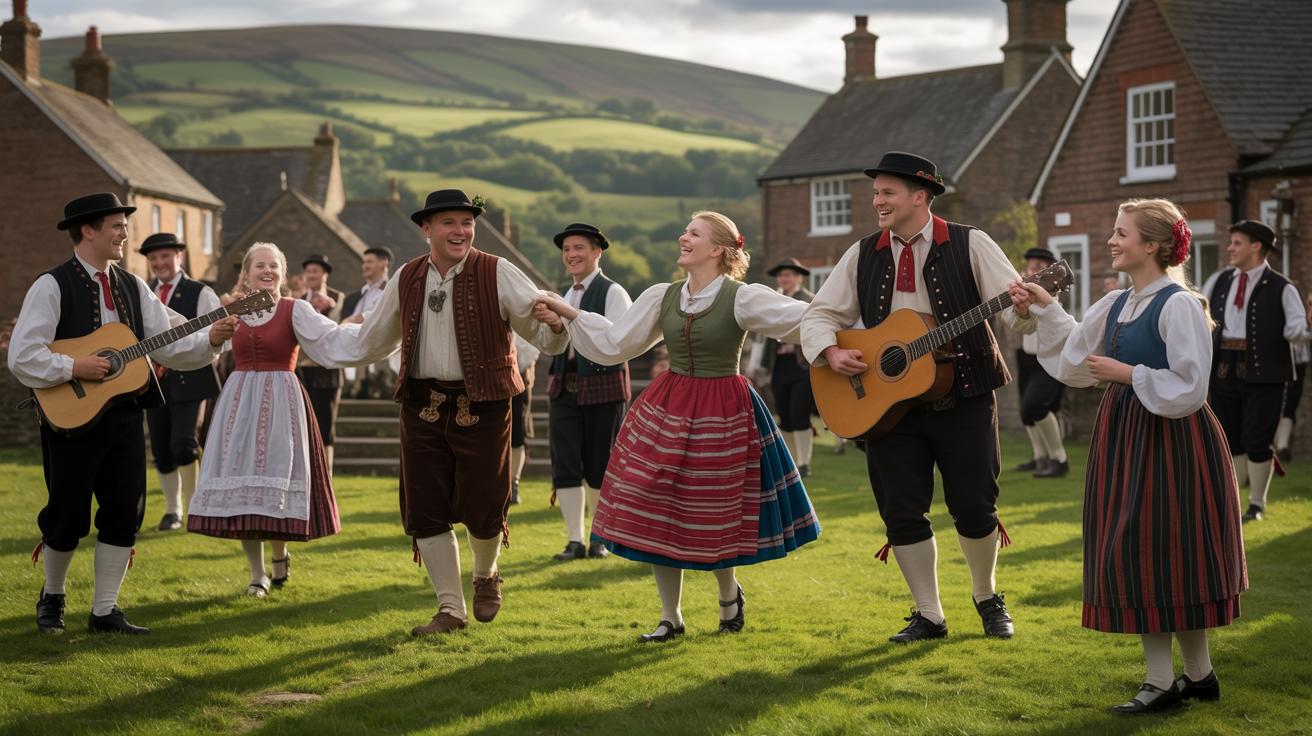What You Need to Know
- 📖 Lally MacBeth’s “The Lost Folk” serves as a manifesto to preserve Britain’s rich folk traditions amidst the digital age.
- 🧩 Her work is inspired by personal discoveries, including her late great-aunt’s family archive, highlighting the importance of personal connections in cultural preservation.
- 🎭 Modern media, such as plays, films, and music, play a significant role in reviving and maintaining the visibility of traditional folk customs.
- 🌍 MacBeth emphasizes the diverse influences in British folk culture, celebrating contributions from communities of color and challenging traditional narratives.
- 📣 The book is a call to action, urging readers to engage actively with and safeguard the rich tapestry of folk traditions for future generations.
In a world where digital culture dominates, the rich tapestry of British folk traditions is at risk of fading away. Lally MacBeth’s work, especially through her book “The Lost Folk,” underscores the importance of preserving these cherished customs. MacBeth’s mission is not just about nostalgia; it’s about safeguarding the essence of a culture that has shaped communities for generations. Through her writing and initiatives, she invites us to delve into the world of folk culture, urging us to appreciate and protect these traditions before they vanish forever.
The Urgency of Preserving Folk Culture
The digital age has brought about significant changes in how we interact with culture, often pushing traditional practices to the periphery. Lally MacBeth’s manifesto, “The Lost Folk,” emphasizes the urgency of preserving these traditions, which are at risk of being lost amidst the digital noise. In her book, MacBeth argues that the disappearance of these cultural elements would lead to a loss of identity and history. Her work highlights the importance of analogue, handmade archives and the need to document these practices meticulously. The book serves as a call to action, encouraging readers to actively engage with and preserve their cultural heritage. By focusing on the present and future of folk traditions, MacBeth’s work inspires a renewed interest in these customs, ensuring they remain a vital part of our cultural landscape.
Personal Roots and Discoveries
MacBeth’s passion for folk culture is deeply rooted in her personal experiences. Her journey began with a summer spent sorting through her late great-aunt’s family archive. Among the forgotten items, she discovered meticulously cataloged boxes and a program for the 300th-anniversary production of John Milton’s courtly masque Comus. This discovery, alongside a photograph of her great-aunt’s mother as an actor in the production, sparked MacBeth’s interest in folk traditions. These personal connections form the backbone of her book, illustrating how individual stories contribute to the larger narrative of folk culture. MacBeth’s approach is akin to creating a Victorian crazy patchwork quilt, piecing together stories, objects, and customs to form a cohesive narrative. Her work serves as a reminder that preserving folk culture begins with acknowledging and valuing personal histories.
Reviving Folk Traditions in Modern Times
Despite the challenges posed by modernity, there have been notable efforts to keep folk traditions alive. In the past 15 years, various media have contributed to the revival of these customs. Productions like Jez Butterworth’s “Jerusalem,” films by Ben Wheatley, and TV shows such as “Detectorists” have played a significant role in bringing folk traditions to the forefront. Music by artists like Shirley Collins and Goblin Band has also helped maintain the presence of folk songs in contemporary culture. These efforts demonstrate that while the term “lost” may imply a need for rescue, the reality is that many of these traditions continue to thrive. By highlighting these modern revivals, MacBeth shifts the focus from the idea of loss to the active preservation and celebration of folk culture in today’s world.
Diverse Influences and Contributions
MacBeth’s work also explores the diverse influences and contributions to British folk culture. She highlights the role of communities of color, whose customs are often underrepresented in traditional narratives. By recognizing these contributions, MacBeth not only broadens the scope of folk culture but also challenges accusations of nationalism and nativism often associated with it. Her book celebrates institutions like the St Fagans National Museum of History in Wales, which includes effigies of Hindu goddesses made by migrant communities. Additionally, she acknowledges the efforts of artists like Angeline Morrison, who incorporate Black British people into traditional songs. MacBeth’s inclusive approach enriches the understanding of folk culture, illustrating how it evolves through diverse influences and continues to adapt to changing societal dynamics.
Lally MacBeth’s “The Lost Folk” serves as both an urgent call to action and a celebration of British folk culture. By weaving personal narratives with broader cultural insights, MacBeth invites readers to engage with the rich tapestry of traditions that define a nation’s identity. Her work challenges us to consider how we can actively participate in preserving and celebrating these customs. As we navigate the complexities of modern life, the question remains: How can we ensure that the vibrant legacy of folk culture continues to inspire and resonate with future generations?
Did you like it?4.5/5 (28)






6 comments
grayson
I’m inspired! Let’s bring back folk festivals and celebrate our diverse heritage like never before!
JadeCatalyst5
Lally’s book sounds amazing! Is there an audiobook version available for those of us always on the go?
wyatt_seraphim
This is a great initiative. What are some specific traditions that are at risk of disappearing?
Tigger
Does anyone else think it’s time for a folk dance-off in our local streets? 😄
Willow_Empyreal
Thank you, Lally MacBeth, for shedding light on such an important issue. We must cherish our cultural heritage!
nathan
Wow, this sounds fascinating! How can I get involved in preserving these traditions myself?